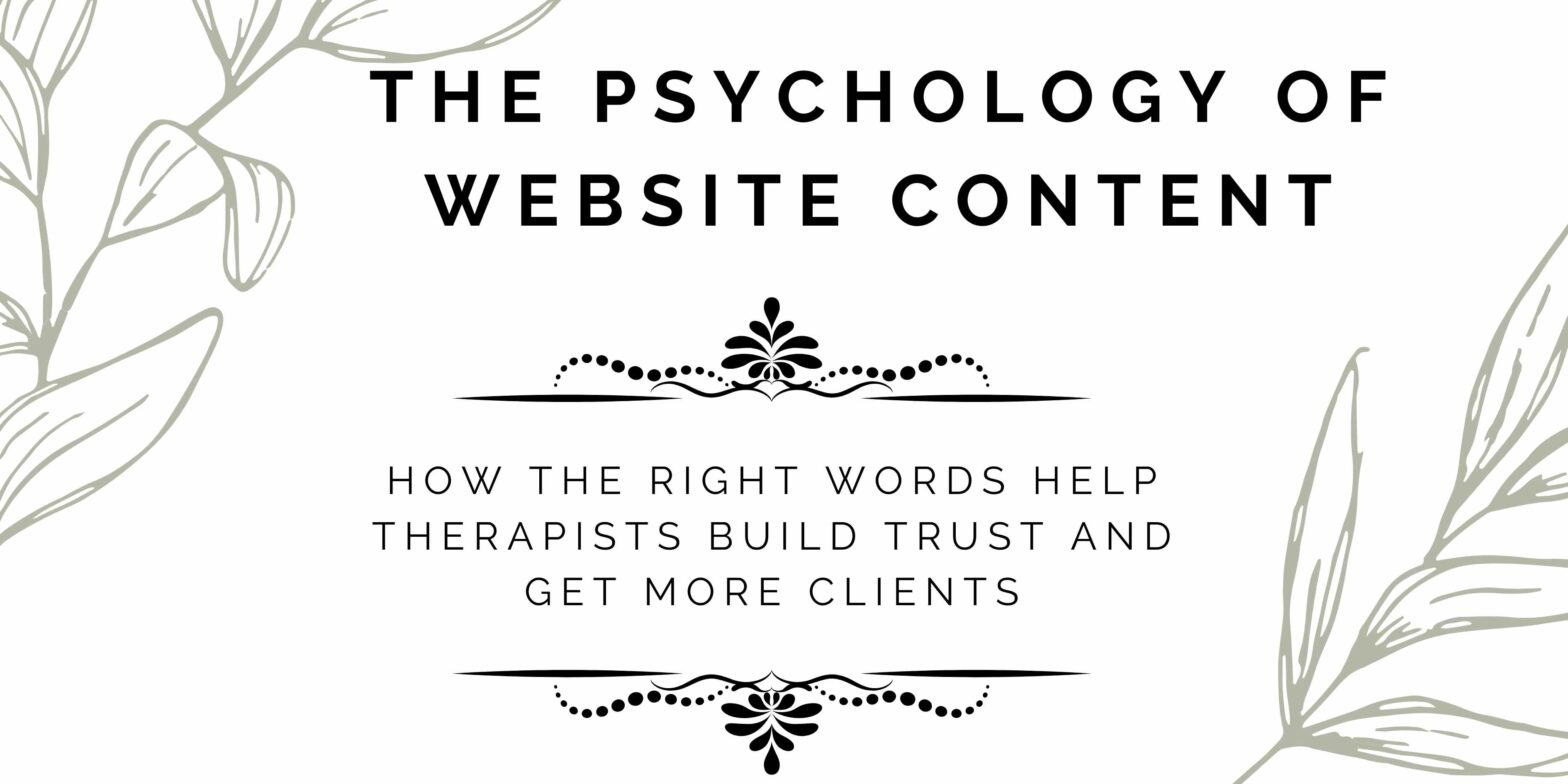When a potential client lands on your therapy website, they’re often in a vulnerable place. They may be feeling anxious, overwhelmed, uncertain, or even skeptical about whether therapy is right for them. Before they ever reach out, your website’s words need to do the work of reassuring them, building trust, and helping them feel safe enough to take that next step.
A beautifully designed website is important—but design alone won’t convert visitors into clients. What truly matters is the psychology behind your website content—how it speaks to your ideal client’s emotions, fears, and hopes. The right words don’t just inform; they guide, validate, and encourage action.
So how do you write website content that feels authentic, engaging, and deeply trustworthy? Let’s break down the psychological principles behind effective therapist website copy and how you can use them to attract and retain the right clients.
1. The Power of Emotional Resonance: Speak to the Client’s Experience
One of the biggest mistakes therapists make on their websites is leading with their credentials, training, and modalities instead of focusing on the client’s emotional experience.
💡 What Potential Clients Are Thinking:
✔ “Does this therapist understand what I’m going through?”
✔ “Do they work with people like me?”
✔ “Can they help me feel better?”
Instead of opening your website with something like:
🚫 “I am a Licensed Clinical Social Worker with 15 years of experience in trauma-focused therapy.”
Try this:
✅ “If you feel stuck in painful patterns, struggle with overwhelming thoughts, or find yourself repeating cycles that no longer serve you, you’re not alone. Therapy can help you break free and move toward a life that feels more aligned, fulfilling, and peaceful.”
💡 Why This Works:
✔ Validates the client’s experience before introducing yourself
✔ Uses emotionally resonant, relatable language
✔ Positions therapy as the path to relief and transformation
How to Apply This to Your Website:
- Open your homepage and service pages with a statement that speaks directly to your ideal client’s concerns.
- Use empathetic language rather than clinical terminology.
- Validate why they might be hesitant about therapy and reassure them.
2. Clarity and Simplicity: Avoid Jargon and Overly Clinical Language
Many therapists unintentionally write website content that feels like an academic research paper, packed with jargon, long paragraphs, and clinical terminology. While this might be impressive to colleagues, it can be alienating for potential clients.
🚫 Common Mistake:
“I integrate a psychodynamic framework with somatic experiencing and an attachment-based approach to help clients navigate internalized trauma.”
✅ Better Approach:
“I help people heal from past wounds by exploring emotions, strengthening relationships, and developing tools for self-compassion.”
💡 Why This Works:
✔ Keeps the language accessible to the average reader
✔ Clearly communicates the benefits of your therapy style
✔ Doesn’t overwhelm or intimidate potential clients
How to Apply This to Your Website:
- Write the way you would speak to a new client. If it wouldn’t feel natural in a session, don’t put it on your website.
- Use short paragraphs and simple explanations—this makes content easier to digest.
- Focus on how therapy helps, not just what it is.
3. The Psychology of Trust: Show, Don’t Just Tell
Clients aren’t just looking for therapy; they’re looking for someone they can trust with their most personal struggles. A great therapist website builds trust by demonstrating competence, warmth, and approachability.
How to Build Trust Through Website Content:
✅ Use client-centered language. Instead of “I help clients overcome anxiety,” say, “You don’t have to live with constant worry—together, we’ll find ways to help you feel calmer and more in control.”
✅ Include a compelling About Page. Instead of just listing degrees and certifications, share a bit about why you became a therapist and what your approach feels like.
✅ Incorporate real-life examples. Without breaking confidentiality, you can include phrases like:
“Many of my clients come to therapy feeling stuck in negative thought patterns. In our work together, we explore these patterns and develop tools to create lasting change.”
✅ Offer clear next steps. Tell visitors exactly how to book a consultation, contact you, or learn more about your practice.
4. The Psychology of Action: Guide Clients Toward the Next Step
A beautifully written website is useless if it doesn’t encourage visitors to take action. Many therapists unknowingly write passive website content, which leads to lost opportunities for client inquiries.
🚫 Weak CTA (Call to Action):
“If you’re interested in therapy, feel free to reach out at your convenience.”
✅ Strong CTA:
“Taking the first step toward therapy can feel intimidating, but you don’t have to do it alone. If you’re ready to explore how therapy can help, I offer a free 15-minute consultation. Click below to schedule a time that works for you.”
💡 Why This Works:
✔ Acknowledges the emotional barrier to reaching out
✔ Gives a clear, easy next step
✔ Creates a sense of invitation and reassurance
How to Apply This to Your Website:
- Make sure every page has a clear, compelling CTA.
- Use buttons for scheduling and contacting you, rather than just text links.
- Reassure visitors that taking the next step is simple and pressure-free.
Words Are Your Strongest Tool for Building a Thriving Practice
The psychology behind your website content is almost as important as the therapy itself. Every word on your website should:
✔ Help potential clients feel seen and understood
✔ Reduce anxiety about reaching out
✔ Build trust and establish you as a compassionate expert
✔ Encourage action so visitors become paying clients
This isn’t about marketing tricks—it’s about using words in a way that aligns with how the human brain processes trust, connection, and decision-making.
Want a Website That Attracts and Converts the Right Clients?
I specialize in writing engaging, psychology-informed website content for therapists that helps you:
✔ Rank higher in search results so clients can easily find you
✔ Communicate your approach in a way that resonates with the right people
✔ Build trust through client-centered, emotionally attuned messaging
✔ Turn website visitors into paying clients—without sounding “salesy”
With a background in counseling psychology and years of experience crafting high-converting content for therapy websites, I know how to write in a way that is both professional and deeply personal—so your ideal clients feel instantly at ease.
Learn More About My Writing Services for Therapists
RELATED RESOURCES:

